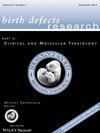Meredith M Howley, Marilyn L Browne, Alissa R Van Zutphen, Sandra D Richardson, Sarah J Blossom, Cheryl S Broussard, Suzan L Carmichael, Charlotte M Druschel
下载PDF
{"title":"国家出生缺陷预防研究中的母体自身免疫性疾病与出生缺陷","authors":"Meredith M Howley, Marilyn L Browne, Alissa R Van Zutphen, Sandra D Richardson, Sarah J Blossom, Cheryl S Broussard, Suzan L Carmichael, Charlotte M Druschel","doi":"10.1002/bdra.23527","DOIUrl":null,"url":null,"abstract":"<p><strong>Background: </strong>Little is known about the association between maternal autoimmune disease or its treatment and the risk of birth defects. We examined these associations using data from the National Birth Defects Prevention Study, a multi-site, population-based, case-control study.</p><p><strong>Methods: </strong>Analyses included 25,116 case and 9897 unaffected control infants with estimated delivery dates between 1997 and 2009. Information on autoimmune disease, medication use, and other pregnancy exposures was collected by means of telephone interview. Adjusted odds ratios (ORs) and 95% confidence intervals (CIs) were estimated for birth defects with five or more exposed cases; crude ORs and exact 95% CIs were estimated for birth defects with three to four exposed cases.</p><p><strong>Results: </strong>Autoimmune disease was reported by 373 mothers (279 case and 94 control mothers). The majority of birth defects evaluated were not associated with autoimmune disease; however, a statistically significant association between maternal autoimmune disease and encephalocele was observed (OR, 4.64; 95% CI, 1.95-11.04). Eighty-two mothers with autoimmune disease used an immune modifying/suppressing medication during pregnancy; this was associated with encephalocele (OR, 7.26; 95% CI, 1.37-24.61) and atrial septal defects (OR, 3.01; 95% CI, 1.16-7.80).</p><p><strong>Conclusion: </strong>Our findings suggest maternal autoimmune disease and treatment are not associated with the majority of birth defects, but may be associated with some defects, particularly encephalocele. Given the low prevalence of individual autoimmune diseases and the rare use of specific medications, we were unable to examine associations of specific autoimmune diseases and medications with birth defects. Other studies are needed to confirm these findings. Birth Defects Research (Part A) 106:950-962, 2016. © 2016 Wiley Periodicals, Inc.</p>","PeriodicalId":8983,"journal":{"name":"Birth defects research. Part A, Clinical and molecular teratology","volume":"25 1","pages":"950-962"},"PeriodicalIF":0.0000,"publicationDate":"2016-11-01","publicationTypes":"Journal Article","fieldsOfStudy":null,"isOpenAccess":false,"openAccessPdf":"https://www.ncbi.nlm.nih.gov/pmc/articles/PMC5305117/pdf/","citationCount":"0","resultStr":"{\"title\":\"Maternal autoimmune disease and birth defects in the National Birth Defects Prevention Study.\",\"authors\":\"Meredith M Howley, Marilyn L Browne, Alissa R Van Zutphen, Sandra D Richardson, Sarah J Blossom, Cheryl S Broussard, Suzan L Carmichael, Charlotte M Druschel\",\"doi\":\"10.1002/bdra.23527\",\"DOIUrl\":null,\"url\":null,\"abstract\":\"<p><strong>Background: </strong>Little is known about the association between maternal autoimmune disease or its treatment and the risk of birth defects. We examined these associations using data from the National Birth Defects Prevention Study, a multi-site, population-based, case-control study.</p><p><strong>Methods: </strong>Analyses included 25,116 case and 9897 unaffected control infants with estimated delivery dates between 1997 and 2009. Information on autoimmune disease, medication use, and other pregnancy exposures was collected by means of telephone interview. Adjusted odds ratios (ORs) and 95% confidence intervals (CIs) were estimated for birth defects with five or more exposed cases; crude ORs and exact 95% CIs were estimated for birth defects with three to four exposed cases.</p><p><strong>Results: </strong>Autoimmune disease was reported by 373 mothers (279 case and 94 control mothers). The majority of birth defects evaluated were not associated with autoimmune disease; however, a statistically significant association between maternal autoimmune disease and encephalocele was observed (OR, 4.64; 95% CI, 1.95-11.04). Eighty-two mothers with autoimmune disease used an immune modifying/suppressing medication during pregnancy; this was associated with encephalocele (OR, 7.26; 95% CI, 1.37-24.61) and atrial septal defects (OR, 3.01; 95% CI, 1.16-7.80).</p><p><strong>Conclusion: </strong>Our findings suggest maternal autoimmune disease and treatment are not associated with the majority of birth defects, but may be associated with some defects, particularly encephalocele. Given the low prevalence of individual autoimmune diseases and the rare use of specific medications, we were unable to examine associations of specific autoimmune diseases and medications with birth defects. Other studies are needed to confirm these findings. Birth Defects Research (Part A) 106:950-962, 2016. © 2016 Wiley Periodicals, Inc.</p>\",\"PeriodicalId\":8983,\"journal\":{\"name\":\"Birth defects research. Part A, Clinical and molecular teratology\",\"volume\":\"25 1\",\"pages\":\"950-962\"},\"PeriodicalIF\":0.0000,\"publicationDate\":\"2016-11-01\",\"publicationTypes\":\"Journal Article\",\"fieldsOfStudy\":null,\"isOpenAccess\":false,\"openAccessPdf\":\"https://www.ncbi.nlm.nih.gov/pmc/articles/PMC5305117/pdf/\",\"citationCount\":\"0\",\"resultStr\":null,\"platform\":\"Semanticscholar\",\"paperid\":null,\"PeriodicalName\":\"Birth defects research. Part A, Clinical and molecular teratology\",\"FirstCategoryId\":\"1085\",\"ListUrlMain\":\"https://doi.org/10.1002/bdra.23527\",\"RegionNum\":0,\"RegionCategory\":null,\"ArticlePicture\":[],\"TitleCN\":null,\"AbstractTextCN\":null,\"PMCID\":null,\"EPubDate\":\"\",\"PubModel\":\"\",\"JCR\":\"Q\",\"JCRName\":\"Medicine\",\"Score\":null,\"Total\":0}","platform":"Semanticscholar","paperid":null,"PeriodicalName":"Birth defects research. Part A, Clinical and molecular teratology","FirstCategoryId":"1085","ListUrlMain":"https://doi.org/10.1002/bdra.23527","RegionNum":0,"RegionCategory":null,"ArticlePicture":[],"TitleCN":null,"AbstractTextCN":null,"PMCID":null,"EPubDate":"","PubModel":"","JCR":"Q","JCRName":"Medicine","Score":null,"Total":0}
引用次数: 0
引用
批量引用
Maternal autoimmune disease and birth defects in the National Birth Defects Prevention Study.
Background: Little is known about the association between maternal autoimmune disease or its treatment and the risk of birth defects. We examined these associations using data from the National Birth Defects Prevention Study, a multi-site, population-based, case-control study.
Methods: Analyses included 25,116 case and 9897 unaffected control infants with estimated delivery dates between 1997 and 2009. Information on autoimmune disease, medication use, and other pregnancy exposures was collected by means of telephone interview. Adjusted odds ratios (ORs) and 95% confidence intervals (CIs) were estimated for birth defects with five or more exposed cases; crude ORs and exact 95% CIs were estimated for birth defects with three to four exposed cases.
Results: Autoimmune disease was reported by 373 mothers (279 case and 94 control mothers). The majority of birth defects evaluated were not associated with autoimmune disease; however, a statistically significant association between maternal autoimmune disease and encephalocele was observed (OR, 4.64; 95% CI, 1.95-11.04). Eighty-two mothers with autoimmune disease used an immune modifying/suppressing medication during pregnancy; this was associated with encephalocele (OR, 7.26; 95% CI, 1.37-24.61) and atrial septal defects (OR, 3.01; 95% CI, 1.16-7.80).
Conclusion: Our findings suggest maternal autoimmune disease and treatment are not associated with the majority of birth defects, but may be associated with some defects, particularly encephalocele. Given the low prevalence of individual autoimmune diseases and the rare use of specific medications, we were unable to examine associations of specific autoimmune diseases and medications with birth defects. Other studies are needed to confirm these findings. Birth Defects Research (Part A) 106:950-962, 2016. © 2016 Wiley Periodicals, Inc.

 求助内容:
求助内容: 应助结果提醒方式:
应助结果提醒方式:


